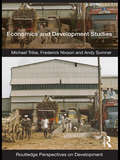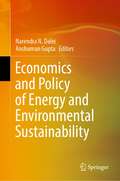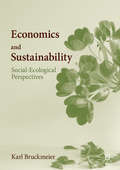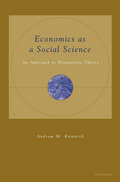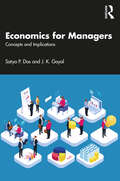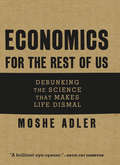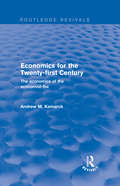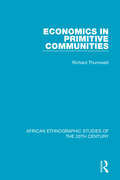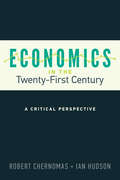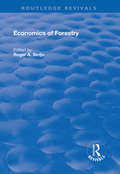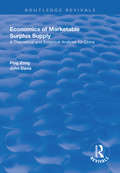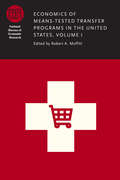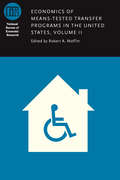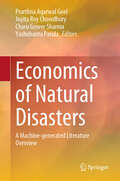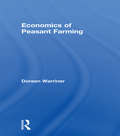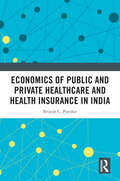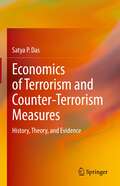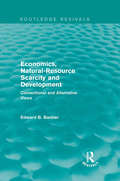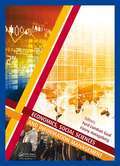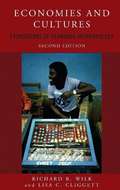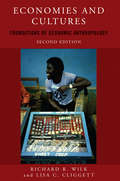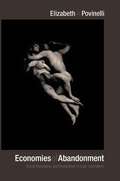- Table View
- List View
Economics and Development Studies
by Andy Sumner Michael Tribe Frederick NixsonDevelopment studies textbooks and courses have sometimes tended to avoid significant economic content. However, without an understanding of the economic aspects of international development many of the more complex issues cannot be fully comprehended. Economics and Development Studies makes the economic dimension of discourse around controversial issues in international development accessible to second and third year undergraduate students working towards degrees in development studies. Following an introductory chapter outlining the connections between development economics and development studies, this book consists of eight substantive chapters dealing with the nature of development economics, economic growth and structural change, economic growth and developing countries, economic growth and economic development since 1960, the global economy and the Third World, developing countries and international trade, economics and development policy, and poverty, equality and development economists, with a tenth concluding chapter. This book synthesizes existing development economics literature in order to identify the salient issues and controversies and make them accessible and understandable. The concern is to distinguish differences within the economics profession, and between economists and non-economists, so that the reader can make informed judgments about the sources of these differences, and about their impact on policy analysis and policy advice. The book features explanatory text boxes, tables and diagrams, suggestions for further reading, and a listing of the economic concepts used in the chapters.
Economics and Policy of Energy and Environmental Sustainability
by Anshuman Gupta Narendra N. DaleiThis book explores the linkages among economic development, energy, and environment. An increase in economic activity is correlated with a higher level of energy consumption, which in turn leads to an increase in environmental pollution. Due to the influence of greenhouse gases, the higher the concentration of pollutants in the atmosphere, the higher the temperature, which ultimately leads to climate change. Under these imminent dangers, the role of economic and energy efficiency policies becomes important for ecological sustainability. The present policies, however, in various instances, have failed to address these issues. Hence, this book embarks not only to suggest modifications to improve the efficacy of the current policies but also to recommend to the policymakers, new and more effective policies for their respective countries. The book is bifurcated into two sections: The Economics and Policy of Sustainable Energy section discusses renewable energy policy responses to observed Impact of climate change using DPSIR Framework; the energy utilization strategies for transportation and commercial activities of Charland Bangladesh; the relationship of market globalization with the Indian energy sector; the socioecological effects of globalization from an energy perspective brought to a local standpoint; the seasonal disaster-induced energy consumption strategies of the char-dwellers of Bangladesh with respect to their domestic chores and agricultural activities; trends in GDP growth and energy usage in India; cross-border trade of electricity; and the events that the oil and gas industry has already faced and possible strategies it can adopt to overcome the recession caused by the COVID-19 pandemic. The Economics and Policy of Environmental Sustainability section analyses topics such as the role of hyper-globalization in spreading the pandemic across countries as threat to human ecology; the current scenario of environmental consequences, and future prospects of plastic pollution; the surface air temperature anomalies over selected countries of Africa; the impaired roles of the female gender in community natural resource exploitation in Ndop; the operational expansion strategies for garnering better output in terms of livelihood and conservation; opportunity for environmental justice and rethinking global community; linking indigenous traditional knowledge and sustainable development goals in the North-Western Himalayas; and recommendations to manage dry forest carbon stock. This book is a rich resource for policymakers, guiding them through untraveled pathways. Moreover, it is an extremely helpful resource for researchers, practitioners, industry professionals as well as students in the fields of energy, environment, and sustainable development with flavour of economics and policy.
Economics and Sustainability: Social-Ecological Perspectives
by Karl BruckmeierThis textbook provides an overview of economic perspectives on sustainability. It synthesises economic, ecological and interdisciplinary sustainability research and by applying an integrated social-ecological and economic framework, demonstrates how this research can be improved and implemented in practice. Split into three parts, the book begins by introducing a range of topics forming the basis of knowledge needed to understand the varying sustainability discourses in economics, ecology and interdisciplinary sustainability research. Chapters cover the political context of sustainability; the history of sustainability in European environmental discourses dating back to the seventeenth century; as well as various problems and forms of interdisciplinary knowledge integration and synthesis in the sustainability process. Part II reviews the core economic themes relevant to sustainable development including natural resource management, environmental economics and ecological economics. Also highlighted are often neglected issues such as conflicts, disasters and interrelated crises on the way towards sustainability. The chapters in Part III discuss the future of the sustainability process. They argue for the necessity of overhauling the relationship between science and practice; explore failures and the unforeseen difficulties of sustainability transformation; and discuss how to enable a long term sustainability process that reaches into the distant future.An innovative resource for a broad range of interdisciplinary programmes on sustainability. The book will be an invaluable reference for master and PhD students, instructors, researchers and practitioners in sustainability governance.
Economics as a Social Science
by Andrew M. KamarckEconomics as a Social Scienceis a highly readable critique of economic theory, based on a wide range of research, that endeavors to restore economics to its proper role as a social science. Contrary to conventional economic theory, which assumes that people have no free will, this book instead bases economics on the realistic assumption that human beings can choose; that we are complex beings affected by emotion, custom, habit, and reason; and that our behavior varies with circumstances and times. It embraces the findings of history, psychology, and other social sciences and the insights from great literature on human behavior as opposed to the rigidity set by mathematical axioms that define how economics is understood and practiced today. Andrew M. Kamarck demonstrates that only rough accuracy is attainable in economic measurement, and that understanding an economy requires knowledge from other disciplines. The canonical hypotheses of economics (perfect rationality, self-interest, equilibrium) are shown to be inadequate (and in the case of "equilibrium" to be counterproductive to understanding the forces that dominate the economy), and more satisfactory assumptions provided. The market is shown to work imperfectly and to require appropriate institutions to perform its function reasonably well. Further, Kamarck argues that self-interest does not always lead to helping the general interest. Economics as a Social Scienceexamines and revises the fundamental assumptions of economics. Because it avoids jargon and explains terms carefully, it will be of interest to economics majors as well as to graduate students of economics and other social sciences, and social scientists working in government and the private sector. Andrew M. Kamarck is former Director, Economic Development Institute, the World Bank.
Economics for Managers: Concepts and Implications
by Satya P. Das J.K. GoyalThis book will sharpen the core decision-making skills of budding managers and entrepreneurs through the concepts, logic, and principles of microeconomics used in the book with suitable examples and cases from multiple industries from across the world. By placing strong emphasis on the fundamental theories, concepts, and their application in real-life business scenarios, the book presents chapters infused with relevant case-lets, snippets, and exercises. Written in simple and engaging conversational style, this book makes complex topics easily comprehensible to the readers who have virtually no background in economics.This book will be useful to students, researchers, and teachers from the field of economics, applied economics, and business studies. Additionally, this book would also be an invaluable companion to aspiring business managers and corporate leaders.
Economics for the Rest of Us: Debunking the Science that Makes Life Dismal
by Moshe Adler&“Vivid case studies . . . Adler&’s frustration with wrongheaded economic thinking is as entertaining as it is thought provoking.&” —Publishers Weekly Why do so many contemporary economists consider food subsidies in starving countries, rent control in rich cities, and health insurance everywhere &“inefficient&”? Why do they feel that corporate executives deserve no less than their multimillion-dollar &“compensation&” packages and workers no more than their meager wages? Here is a lively and accessible debunking of the two elements that make economics the &“science&” of the rich: the definition of what is efficient and the theory of how wages are determined. The first is used to justify the cruelest policies, the second grand larceny. Filled with lively examples—from food riots in Indonesia to eminent domain in Connecticut and everyone from Adam Smith to Jeremy Bentham to Larry Summers—Economics for the Rest of Us shows how today&’s dominant economic theories evolved, how they explicitly favor the rich over the poor, and why they&’re not the only or best options. Written for anyone with an interest in understanding contemporary economic thinking—and why it is dead wrong—Economics for the Rest of Us offers a foundation for a fundamentally more just economic system. &“Brilliant.&” —David Cay Johnston, Pulitzer Prize–winning and New York Times–bestselling author of It&’s Even Worse Than You Think
Economics for the Twenty-first Century: The Economics of the Economist-fox
by Andrew M. KamarckThis title was first published in 2001. To be effective, economics must take into consideration the complex nature of human beings and the contextual, institutional, social and historical factors at play. This text is designed to help economists to be economic foxes by increasing the range of economists' tools, drawing on the knowledge and experience of other disciplines, to cope better with the extraordinary complexity of the modern economy. The objective is to provide the same kind of revelation in understanding an economy that an artist possesses in the visual arts. A beginner looking at a still life sees a green bottle, a red apple and a yellow cloth on a table top. An artist, however, can point out to him all the nuances of colour. Following a rapid dissection of the canonical hypotheses of contemporary economic theory, different sectors of the real economy are explored: the corporation; corporate governance; services; the public sector; civil society; professions; social capital; national cultures; and the tropics.
Economics in Primitive Communities
by Richard ThurnwaldOriginally published in 1932, this book discusses aspects of economic life in Africa. Detailed consideration is given to food production, population increase, hunting, herding, distribution of goods and wealth, ownership and property, trade, feudalism and slavery.
Economics in the Twenty-First Century: A Critical Perspective
by Ian Hudson Robert ChernomasEconomics has always been nicknamed the "dismal science," but today the field seems a little more dismal than usual as governments, social movements, and even students complain that the discipline is failing to make sense of the major economic problems of the day.In Economics in the Twenty-First Century, Robert Chernomas and Ian Hudson demonstrate how today's top young economists continue to lead the field in the wrong direction. The recent winners of the John Bates Clark medal, economics's "baby Nobel," have won that award for studying important issues such as economic development, income inequality, crime, and health. Examining their research, Chernomas and Hudson show that this work focuses on individual choice, ignores the systematic role of power in the economic system, and leads to solutions that are of limited effectiveness at best and harmful at worst.An accessible summary of the latest debates in economics, Economics in the Twenty-First Century takes on what is missing from mainstream economics, why it matters, and how the discipline can better address the key concerns of our era.
Economics of Forestry: A Global Assessment (Routledge Revivals)
by Roger A. SedjoThis title was first published in 2003. The 'Economics of Forestry' is a specialized subset of resource economics addressing a specific natural resource - the forest - which is usually a relatively long time period. Hence, forest economics has characteristics similar to nonrenewable resources but also has those of a renewable resource, in some cases approaching those of agriculture. This volume comprises some of the most significant journal essays in forest economics and forest policy. The International Library of Environmental Economics and Policy explores the influence of economics on the development of environmental and natural resource policy. In a series of twenty five volumes, the most significant journal essays in key areas of contemporary environmental and resource policy are collected. Scholars who are recognized for their expertise and contribution to the literature in the various research areas serve as volume editors and write essays that provides the context for the collection. Volumes in the series reflect three broad strands of economic research including 1) Natural and Environmental Resources, 2) Policy Instruments and Institutions and 3) Methodology. The editors, in their introduction to each volume, provide a state-of-the-art overview of the topic and explain the influence and relevance of the collected papers on the development of policy. This reference series provides access to the economic literature that has shaped contemporary perspectives on land use analysis and policy.
Economics of Marketable Surplus Supply: Theoretical and Empirical Analysis for China (Routledge Revivals)
by John Davis Ping ZongPublished in 1998. Chinese farm households have been at the centre of the rural reform process since the introduction of the Household Responsibility System in the late 1970’s. There can be little doubt that, for decades to come, they will continue to be a focus of interest both in academic and political circles. This is particularly true in relation to their role of grain sector, when we consider the prominent position of grain in China’s political economy. There is also intense global interest in the impact of the reform process on the country’s future grain self-sufficiency and trade. This book is ambitious in both its scope and remit. Its primary focus is the behaviour of the marketable surplus element of farm households’ grain supply since the beginning of the reform period. The early chapters provide very valuable insights into the nature of the rural reform process; it then looks at the impact of the reforms on the structure of rural economy in general and farm households in particular. This part of the book is rich in statistics on the reform period. In the analytical section the emphasis is on the difficult area of household modelling, covering both theoretical and empirical aspects. Despite the data limitations, which the authors acknowledge, these chapters provide very valuable analyses of the grain price changes. In particular, their use of models which capture the interdependencies between grain marketable surplus supply is a genuine contribution. This book should be read by anyone with an interest in the rural reform process in China and will be of particular relevance to students, scholars and the policy community.
Economics of Means-Tested Transfer Programs in the United States, Volume I
by Robert A. MoffittFew government programs in the United States are as controversial as those designed to help the poor. From tax credits to medical assistance, the size and structure of the American safety net is an issue of constant debate. These two volumes update the earlier Means-Tested Transfer Programs in the United States with a discussion of the many changes in means-tested government programs and the results of new research over the past decade. While some programs that experienced falling outlays in the years prior to the previous volume have remained at low levels of expenditure, many others have grown, including Medicaid, the Earned Income Tax Credit, the Supplemental Nutrition Assistance Program, and subsidized housing programs. For each program, the contributors describe its origins and goals, summarize its history and current rules, and discuss recipients’ characteristics and the types of benefits they receive. This is an invaluable reference for researchers and policy makers that features detailed analyses of many of the most important transfer programs in the United States.
Economics of Means-Tested Transfer Programs in the United States, Volume II
by Robert A. MoffittFew government programs in the United States are as controversial as those designed to help the poor. From tax credits to medical assistance, the size and structure of the American safety net is an issue of constant debate. These two volumes update the earlier Means-Tested Transfer Programs in the United States with a discussion of the many changes in means-tested government programs and the results of new research over the past decade. While some programs that experienced falling outlays in the years prior to the previous volume have remained at low levels of expenditure, many others have grown, including Medicaid, the Earned Income Tax Credit, the Supplemental Nutrition Assistance Program, and subsidized housing programs. For each program, the contributors describe its origins and goals, summarize its history and current rules, and discuss recipients’ characteristics and the types of benefits they receive. This is an invaluable reference for researchers and policy makers that features detailed analyses of many of the most important transfer programs in the United States.
Economics of Natural Disasters: A Machine-generated Literature Overview
by Prarthna Agarwal Goel Joyita Roy Chowdhury Charu Grover Sharma Yashobanta ParidaThis book is a machine-generated literature overview that explores the theoretical and empirical aspects of economics of natural disasters such as floods, cyclones, droughts, and earthquakes from a policy perspective. It provides a comprehensive collection of economic theories in Disasters and empirical findings that would benefit scholars in academia and policy-making. On the theory side, there is a growing use of game theory, Input-Output, computable general equilibrium models, and Catastrophe models to analyze the economic impacts of natural disasters. These models provide optimal decisions for the government concerning disaster relief. On the empirical front, studies showing causal and associative relationships between disasters and socio-economic variables are important for estimating disaster-related losses and making appropriate policy suggestions.The book explores different critical aspects and interlinkages of natural disasters; economic, social, and political. Besides having localized effects, disasters influence macroeconomic parameters, such as impacts on international trade and foreign direct investment. Moreover, the effects of disasters are subject to interventions from various national and international agencies. It discusses fiscal pressures caused due to disasters and existing policies related to disaster-risk mitigation and management as a guide to policy-making. It is an important guide to researchers and policymakers examining the socio-economic impact of natural disasters and public investment for disaster-risk mitigation.
Economics of Peasant Farming
by Doreen WarrinerThis book, first published in 1939, was originally conceived as an investigation of peasant farming in Europe written in the years of the agricultural depression of the nineteen-thirties. It shows an immense contrast between the well-capitalized commercial peasant farming of Western Europe and the poor subsistence farming of the remotest parts of Eastern Europe; and between these two extremes a wide range of variation in standards of living and farming efficiency.
Economics of Public and Private Healthcare and Health Insurance in India
by Brijesh C. PurohitThis book critically examines the public and private healthcare systems in India. Analysing the current scenario of health insurance in India, it studies the inadequacy of public healthcare services and unaffordability of private health care facilities. The volume investigates government sponsored health insurance schemes and advocates for the need of universal health insurance coverage. It details India’s per capita health expenditure and provides policy inputs on how healthcare systems and insurance coverage can be improved in the country. Further, it explores the financial parameters of health insurers and standalone private health insurance companies, and also discusses the adverse impact of the Covid-19 pandemic on Indian healthcare. An insightful read on the state of healthcare in India, this book will be of interest to researchers and academics working in the fields of insurance, healthcare administration and management, public health policy and practice, health and social care, medical sociology, and sociology & social policy. It will also be useful for think tanks and policy makers.
Economics of Terrorism and Counter-Terrorism Measures: History, Theory, and Evidence
by Satya P. DasThis textbook presents a systematic study of terrorism from the standpoint of economic analysis. Choosing the kind and level of measures to counter terror is, to a large extent, an economic decision, as counterterrorism (CT) measures and their side effects are costly. This text, contains theoretical models that illustrate the economic mechanisms of different types of CT measures. A vast array of empirical studies and regularities are also presented. Some chapters discuss in depth the empirical results in the literature as well as the underlying statistical/econometric methodologies that go beyond ordinary regression. General Appendix A provides an exposition of the concept of compensating surplus and elements of the basic game theory, to help the reader with an economics background recapitulate micro theory concepts used in the book. General Appendix B lays out the notions of hypothesis testing, regression and more advanced statistical/econometric methods, so that the reader understands or at least can have an intuitive idea of how the results are derived and what they mean with some degree of inner comfort. Aimed at students at the intermediate undergraduate and graduate levels, the text requires knowledge of basic micro, first-order conditions of profit or utility maximization and cost minimization, and statistical concepts of hypothesis testing and regression. This textbook is intended for use in courses in economics, political science, criminal justice, and emergency management. Additionally, professionals working with national security in government and non-governmental organizations may find it useful.
Economics, Natural-Resource Scarcity and Development: Conventional and Alternative Views (Routledge Revivals)
by Edward B BarbierGlobal warming is an increasing problem, tropical forests are being wiped out and major upper watersheds are being degraded. Using insights provided by environmentalism, ecology and thermo-dynamics, this book – first published in 1989 – outlines an economic approach to the use of natural resources and particularly to the problem of environmental degradation. Edward Barbier reviews and critiques the long past of environmental and resource economics and then goes on to elaborate an economics which allows us to develop alternative strategies for dealing with the problems faced. With examples drawn from Latin America and Indonesia, he not only develops a major theoretical advance but shows how it can be applied. Barbier’s work is an important and relevant contribution to the discussion surrounding the economics of environmental sustainability.
Economics, Social Sciences and Information Management: Proceedings of the 2015 International Congress on Economics, Social Sciences and Information Management (ICESSIM 2015), 28-29 March 2015, Bali, Indonesia
by Ford Lumban Gaol Fonny HutagalungThe 2015 International Congress on Economics, Social Sciences and Information Management (ICESSIM 2015), held 28-29 March 2015 in Bali, Indonesia, aimed to provide a platform for the sharing of valuable knowledge and experience in the context of changing economics and social settings. Information technology has changed many aspects in our life, inc
Economics: Michigan Edition Grades 9-12
by Arthur O'Sullivan Steven M. SheffrinThe System includes: Higher-level content that gives support to access complex text, acquire core content knowledge, and tackle rigorous questions. Inquiry-focused Projects, Civic Discussions, and Document Analysis activities that develop content and skills mastery in preparation for real-world challenges; Digital content on Pearson Realize that is dynamic, flexible, and uses the power of technology to bring social studies to life. The program uses essential questions and stories to increase long-term understanding and retention of learning.
Economies and Cultures
by Lisa C. Cliggett Richard R WilkMore than any other anthropological subdiscipline, economic anthropology constantly questions and debates the practical motives of people as they go about their daily lives. Tracing the history of the dialog between anthropology and economics, Richard R. Wilk and Lisa C. Cliggett move economic anthropology beyond the narrow concerns of earlier debates and place the field directly at the center of current issues in the social sciences. They focus on the unique strengths of economic anthropology as a meeting place for symbolic and materialist approaches and for understanding human beings as both practical and cultural. In so doing, the authors argue for the wider relevance of economic anthropology to applied anthropology and identify other avenues for interaction with economics, sociology, and other social and behavioral sciences. The second edition of Economies and Societies contains an entirely new chapter on gifts and exchange that critically approaches the new literature in this area, as well as a thoroughly updated bibliography and guide for students for finding case studies in economic anthropology.
Economies and Cultures
by Richard R. Wilk Lisa CliggettThis synthesis of modern economic anthropology goes to the heart of a thriving subdiscipline and identifies the fundamental practical and theoretical problems that give economic anthropology its unique strengths and vision. More than any other anthropological subdiscipline, economic anthropology constantly questions and debates the practical motives of people as they go about their daily lives. Tracing the history of the dialogue between anthropology and economics, Richard Wilk and Lisa Cliggett move economic anthropology beyond the narrow concerns of earlier debates and place the field directly at the center of current issues in the social sciences. They focus on the unique strengths of economic anthropology as a meeting place for symbolic and materialist approaches and for understanding human beings as both practical and cultural. In so doing, the authors argue for the wider relevance of economic anthropology to applied anthropology and identify other avenues for interaction with economics, sociology, and other social and behavioral sciences. The second edition of Economies and Cultures contains an entirely new chapter on gifts and exchange that critically approaches the new literature in this area, as well as a thoroughly updated bibliography and guide for students for finding case studies in economic anthropology.
Economies and Cultures
by Richard R. Wilk Lisa CliggettThis text is the first synthesis of modern economic anthropology for advanced undergraduates and beginning graduate students. It goes to the heart of an emerging subdiscipline and identifies the fundamental practical and theoretical problems that give economic anthropology its unique strengths and vision. Tracing the history of the dialogue between anthropology and economics, Richard Wilk identifies three recurring arguments about human nature and the moral basis of human action. Modern economic anthropology, he says, emerges from the controversies and tensions between these radically different propositions about the essence of humanity. More than any other anthropological subdiscipline, economic anthropology constantly questions and debates the practical motives of people as they go about their daily lives. Wilk moves economic anthropology beyond the narrow concerns of earlier debates and places the field directly at the center of current issues in the social sciences. He focuses on the unique strengths of economic anthropology as a meeting place for symbolic and materialist approaches, and for understanding humanity as both practical and cultural. In doing so, he argues for the wider relevance of economic anthropology to applied anthropology and identifies other avenues for interaction with economics, sociology, and other social and natural sciences. This short text is designed to be used with monographs or collections as a core reading for economic anthropology courses. It will complement other texts in general sociocultural anthropology courses and in graduate core courses, and it will be a useful supplement in teaching ecological and applied anthropology.
Economies and Cultures: Foundations of Economic Anthropology
by Richard R WilkThis synthesis of modern economic anthropology goes to the heart of a thriving subdiscipline and identifies the fundamental practical and theoretical problems that give economic anthropology its unique strengths and vision. More than any other anthropological subdiscipline, economic anthropology constantly questions and debates the practical motives of people as they go about their daily lives. Tracing the history of the dialogue between anthropology and economics, the authors move economic anthropology beyond the narrow concerns of earlier debates and place the field directly at the centre of current issues in the social sciences. They focus on the unique strengths of economic anthropology as a meeting place for symbolic and materialist approaches and for understanding human beings as both practical and cultural. In so doing, the authors argue for the wider relevance of economic anthropology to applied anthropology and identify other avenues for interaction with economics, sociology, and other social and behavioural sciences. The second edition of Economies and Cultures contains an entirely new chapter on gifts and exchange that critically approaches the new literature in this area, as well as a thoroughly updated bibliography and guide for students for finding case studies in economic anthropology.
Economies of Abandonment: Social Belonging and Endurance in Late Liberalism
by Elizabeth A. PovinelliIn Economies of Abandonment, Elizabeth A. Povinelli explores how late liberal imaginaries of tense, eventfulness, and ethical substance make the global distribution of life and death, hope and harm, and endurance and exhaustion not merely sensible but also just. She presents new ways of conceptualizing formations of power in late liberalism--the shape that liberal governmentality has taken as it has responded to a series of legitimacy crises in the wake of anticolonial and new social movements and, more recently, the "clash of civilizations" after September 11. Based on longstanding ethnographic work in Australia and the United States, as well as critical readings of legal, academic, and activist texts, Povinelli examines how alternative social worlds and projects generate new possibilities of life in the context of ordinary and extraordinary acts of neglect and surveillance. She focuses particularly on social projects that have not yet achieved a concrete existence but persist at the threshold of possible existence. By addressing the question of the endurance, let alone the survival, of alternative forms of life, Povinelli opens new ethical and political questions.
